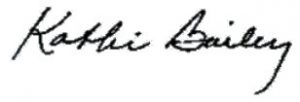Autumn is traditionally a time of giving thanks. Here in the northern hemisphere, the Canadians have already celebrated their Thanksgiving Day. In the US, we will be celebrating on Thursday, November 25th.
Thinking about this month’s Chair’s Report, I wondered about the etymology of the word thanks. A blog called Access2Interpreters provides an article about the history of thank you in languages around the world. It says that the word thank “stems from the Latin word tongēre. The root tong- means ‘think’. Loosely translated, the expression might read ‘I will remember what you have done for me.’”

The Online Etymology Dictionary provides a different answer to this inquiry. It has the following information about the English word thanks:
mid-13c., plural of thank (n.), from Old English þanc, þonc in its secondary sense “grateful thought, gratitude,” from Proto-Germanic *thanka-, from the same root as thank (v.). In prehistoric times the Germanic noun seems to have expanded from “a thinking of, a remembering” to also mean “remember fondly, think of with gratitude.” Compare Old Saxon thank, Old Frisian thank, Old Norse þökk, Dutch dank, German Dank. The Old English noun chiefly meant “thought, reflection, sentiment; mind, will, purpose,” also “grace, mercy, pardon; pleasure, satisfaction.”
Whatever the word’s history may be, this is a good time of year to remember those to whom we should express our gratitude.

In my experience, during this time of year, children’s arts and crafts projects in the US often involve depictions of turkeys, pumpkins, and pilgrim’s hats. One website offers 70 crafts projects categorized as being appropriate for students ranging in age from preschool to eighth grade.
The holiday is sometimes romanticized as a time of peaceful feasting among the English settlers and the local people who helped them get established in 1621, enabling them to survive the first winter. That help is documented in a historical account of the relations between the settlers and the indigenous people. The details of the first Thanksgiving in that story say that there had been a good harvest and the settlers held a feast:
According to the traditional tale, the pilgrims invited their Native American neighbors to this celebration to thank them for their help, the Native Americans brought food to share, and everyone enjoyed a time of fellowship. Actually, there is little in the primary documents that supports this vision.
Unfortunately, in subsequent years, relations broke down and the native people were harmed, and in some instances decimated, by forced relocation, by enslavement, by bloodshed, and by European diseases for which they had no natural immunity. This tragic story reminds me of two important thoughts. First, I should acknowledge that I live and work on the lands of the Esselen Tribe of Monterey County. Second, like members of various TIRF constituencies around the world, I must continue to focus on improved relations among diverse people – partly through improved communication.
There are many Thanksgiving-related sources of information on the internet. For instance, you can see ten “Thanksgiving-Themed Works of Art” by clicking here. Another website provides links to ten of the best thank-you poems. There are also many songs about gratitude. In fact, one website lists songs of thanks in five different categories:
- Best Pop Songs About Gratitude
- Best R&B or Rap Songs About Gratitude
- Best Country Songs About Gratitude
- Best Rock Songs About Gratitude
- Best Religious or Spiritual Songs About Gratitude
Because TIRF’s focus is all about language learning, teaching, and research, let me close by sharing a website that claims to tell us how to say thanks in 45 languages. It will come as no surprise to readers of TIRF Today that the authors ran into the problem of how to define language. In my view, the website really tells us about how to say thanks in 44 different languages, because it lists British English and American English as two different languages, whereas I would consider them to be two of the many varieties of the English language instead.

These differences and similarities are noted on that website. Speakers of British English are likely to say “Thank you / Thanks very much,” while Americans would say “Thank you / Thanks so much / Thanks a lot / Thanks a bunch / Thanks a ton” or just “Thanks!” Informally, the website states, people in the UK might say “Thanks mate” or “Cheers mate” or even just “Ta!” To show extreme gratitude, the Brits might say “You’re a life-saver” or “You’re my hero,” while Americans might say “Thanks a million.”
No matter what language or variety you may use, let me my express my deep gratefulness for your support of TIRF. Your donations go to funding scholarships and awards, and to the day-to-day running of the Foundation. TIRF could not continue to exist without your funding support. On behalf of the Board of Trustees, let me say thank you, again and again.
Best wishes,


